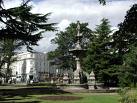
The Hitchman Fountain, Royal Leamington Spa
Image Source: wikimedia
John Hitchman M.R.C.S. (c. 1804 – 3 March 1867) was a British orthodox Surgeon and Hydropath who converted to homeopathy late in his medical career to become a founder and committee member of the Midland Homeopathic Medical Society in 1865.
John Hitchman lived for almost 40 years in Royal Leamington Spa, where he was one of the most renowned doctors in the town. Between 1832 – 1867, Hitchman was Surgeon at the Warneford General Bathing Institution and Leamington Hospital that had opened in 1834.
In 1860, Hitchman founded a Hydropathic Establishment, the Arboretum, and from this time he combined hydropathy and homeopathy, also working with colleague John Stuart Sutherland at 10 Euston Place, Leamington.
Hitchman practiced at several addresses in the town, including initially at Clemens Street, at 55 High Street. From as early as 1839, Hitchman practiced at 35 Lansdowne Place, Leamington.
John Hitchman was born in Chipping Norton, the son of James Hitchman (1773 – 1830) and Sarah Lock Simkins (1768 – 1814). He came to Leamington from Banbury in 1827 or 1828, where he had trained as a surgeon’s assistant.
In 1827, Hitchman was admitted as a member of the Royal College of Surgeons, and the same year was granted a licence by the Worshipful Society of Apothecaries. By the following year, 1828, Hitchman had moved to Leamington.
In 1832, John Hitchman married Staffordshire-born Sarah Baker (c. 1808 – 1890) in Stoke-on-Trent.
While the circumstances behind Hitchman’s embrace of hydrotherapy in 1860 are unknown, his willingness to look beyond the confines of medical orthodoxy for therapeutic solutions was a longstanding professional trait. In an 1857 letter to The Lancet, Hitchman explained that as early as 1849 he had been experimenting with high dilutions, using arsenius acid, in doses of one hundredth of a grain in the treatment of cholera with good success.
Following his conversion to homeopathy in 1865, Hitchman published a lengthy article on “The Cattle Plague and Hydropathy” in the February 1866 edition of Homoeopathic World, in which he contended that the dual truths of Priessnitz and Hahnenmann, hydropathy and homeopathy, were “branches of the same tree and spring from one root.”
On the evening of Thursday 15 June, 1865, John Hitchman, was one of a group of medical men who met at the Stork Hotel in Birmingham to form a new association, the Midland Homoeopathic Medical Society. Hitchman was elected a member of the committee tasked with drawing up the rules of the new society, along with James Smith Ayerst, James Gibbs Blake, George Moore, Henry Robertson, William Sharp, John Stuart Sutherland, and Edward Wynne Thomas.
In 1866, Hitchman co-authored an article, “A Case of Fever Treated Homeopathically and Hydropathically” with Dr. John Stuart Sutherland.
As an adjunct to his medical and surgical work, Hitchman was also especially interested in sanitary reform. For several decades he was actively involved in a range of urban improvement projects in Leamington to improve public health and to alleviate poverty, including serving as Chairman of the Local Board of Health. In 1843, Hitchman was behind the creation of a Labourer’s Employment Fund, supported by the local clergy, dissenting ministers, and middle classes, that disbursed money to local labourers for improvement work done in the town.
Hitchman’s most notable contribution to the public health of Leamington Spa was his founding in 1863 of the Arboretum Hydropathic Establishment, located on Tachbrook Road. From 1865, Hitchman combined hydropathy with homeopathy at the hospital, which survived his death until 1883, when it was taken over and used as an hospice by the Royal Midland Counties Home for Incurables.
Two years after John Hitchman’s death, his allopathic colleague, Dr. Henry Jephson, established a fund to build the Hitchman Fountain at Leamington Spa in his memory.
John Hitchman died at the Arboretum on 3 March 1867, aged 62. His funeral was attended by hundreds of townspeople, and he was buried at Leamington Spa Cemetery, Whitnash Road.
His Obituary was in The British Homeopathic Review, Volume 11 (1 April 1867), The Homoeopathic World Volume 2 (1 April 1867), and in the Homoeopathic Medical Directory, 1868.
Of Interest:
William Hitchman M.R.C.S. F.L.S. (1823 – 1888) [no evident relation] was former resident surgeon at the Liverpool Homoeopathic Dispensary and was author of Consumption: Its Nature, Preservation and Homoeopathic Treatment (1859).
John Hitchman M.R.C.P. (1816 – 1893) [no evident relation] was an orthodox physician and early psychologist who spent much of his career as medical superintendent at the Derbyshire County Lunatic Asylum.


Whilst I was working at Warwick Hospital in 1968/69, I had lodgings in the house on Tachbrook Road, Leamington, which I think Dr Hitchman built and occupied when he opened the Arboretum in 1864. I would be very interested to find a website which has pictures of his house in particular.
Any help would be most appreciated.
Hello Kenneth
I come to you via a Google search on Dr Hitchman and I write wearing my hat as Vice Chairman of the Leamington History Group. I am currently putting together a Leamington Scrapbook in which I plan to include a piece about Dr Hitchman and the Royal Midland Counties Home. I have quite a few photographs and photographs of the RMCH and an early engraving showing the house as built by the good doctor. I fee sure that I can sort out a suitable picture for you if you let me know what you want. Have you had any response from other sources?
Dr Hitchman is commemorated by an ornate fountain in the Jephson Gardens and is buried in Leamington Cemetery just across the road from where the Home was situated. His gravestone is unfortunately smashed.
Best wishes
Alan Griffin
https://www.facebook.com/groups/Leamingtonandwarwick/
There is a beautiful picture of the house on this site.
Alan Griffin, are you a member of this Facebook site. It is Memories of Leamington and Warwick and has some wonderful memories/pictures.
https://www.facebook.com/groups/Leamingtonandwarwick/